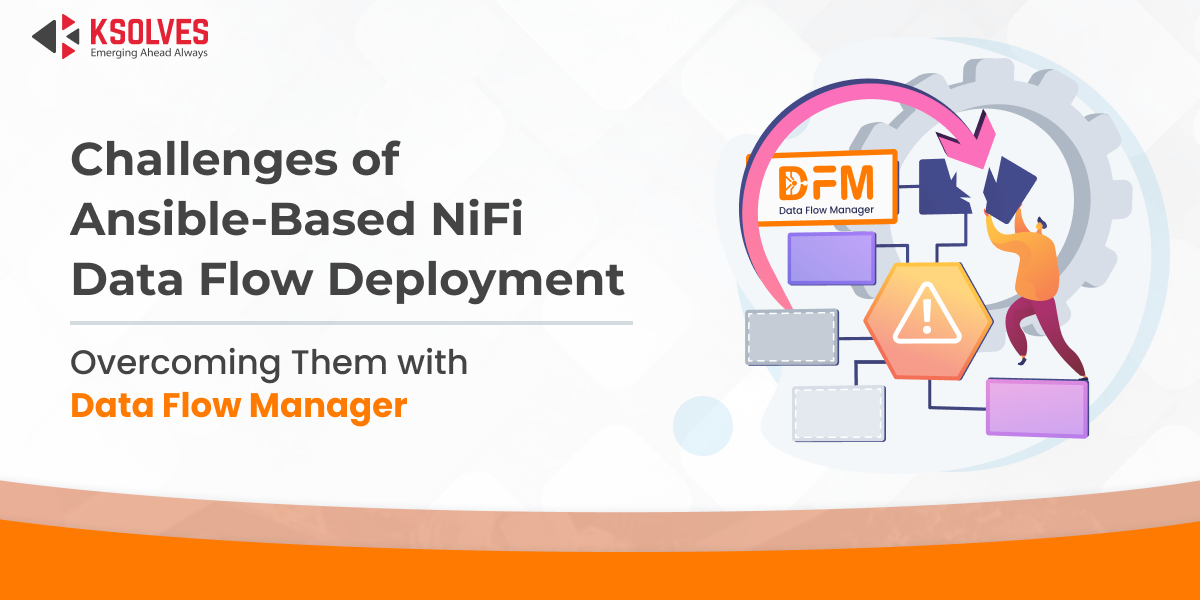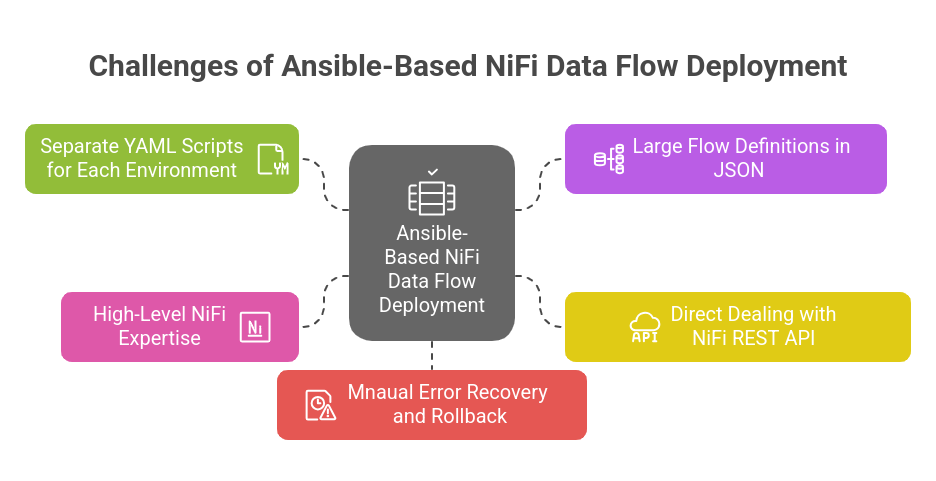Challenges of Deploying NiFi Data Flows with Ansible and How Data Flow Manager Solves
![]()

Are you still relying on Ansible scripts to deploy and promote NiFi data flows across multiple environments?
If so, you’re not alone. Many teams initially adopt Ansible to bring structure and automation to their NiFi data flow deployment and promotion, only to realize later that they’ve traded one form of manual work for another. What looks like automation on the surface often involves complex scripts, time-consuming configurations, and constant troubleshooting behind the scenes.
Apache NiFi is designed to streamline the flow of data across disparate systems, but deploying NiFi data flows from one environment to another is anything but simple when handled manually or through generic automation tools.
That’s where Data Flow Manager comes in.
The Hidden Complexity of Using Ansible for NiFi Data Flow Deployment
Ansible is widely known for automating infrastructure tasks. When applied to NiFi, teams typically use it to automate deployments of flow templates, processor updates, and parameter configurations. But this solution isn’t as seamless as it seems.
In most organizations, using Ansible for NiFi data flow deployment means:
- Creating and maintaining separate YAML scripts for each environment.
- Managing large NiFi flow definitions in JSON format.
- Dealing with NiFi REST API directly for tasks like creating processors or updating flows.
- Requiring high-level NiFi expertise just to move a flow from development to production.
- Spending time on error recovery, rollback scripts, and environment-specific changes.

In essence, teams end up manually managing automation, which is not only time-consuming but also error-prone. When something breaks, the troubleshooting process can be lengthy and requires deep NiFi knowledge. This creates bottlenecks and limits the scalability of your data operations.
Common Challenges with Ansible-Based NiFi Data Flow Deployments
Let’s take a closer look at the typical issues organizations face when managing NiFi data flow deployments with Ansible:
1. Complex and Rigid Scripts
Each environment (Dev, QA, Prod) usually requires its own YAML playbooks. Any change to a NiFi data flow must be carefully reflected across all these files. This creates duplication, increases maintenance, and opens the door to inconsistencies.
2. Difficult NiFi Data Flow Management
NiFi data flows are stored as JSON files, which are difficult to edit manually. Tracking changes or understanding differences between NiFi data flow versions is a challenge, especially when flow definitions become large.
3. Dependency on NiFi Expertise
To interact with the NiFi REST API, teams need developers or DevOps engineers who are familiar with its structure and behavior. This knowledge barrier increases onboarding time and creates silos within the team.
4. Time-Consuming Error Recovery
NiFi data flow deployments don’t always go as planned. When a script fails or a NiFI data flow doesn’t behave as expected, rolling back to a previous version or fixing the issue involves digging into logs, debugging scripts, and restoring old files.
5. Lack of Visibility and Control
Most Ansible setups lack built-in tools for version control, audit trails, or approval workflows. This makes it hard to trace who made what changes and when—a serious issue for regulated industries or large teams.
Introducing Data Flow Manager (DFM)
Data Flow Manager (DFM) is a robust tool designed specifically for on-premise Apache NiFi to simplify the deployment and promotion of Apache NiFi data flows in minutes. Built with the specific needs of data engineering and DevOps teams in mind, DFM replaces the NiFi UI and manual scripts with intuitive controls and smart automation.
Whether you’re deploying or promoting a new NiFi data flow from development to production, tracking changes over time, or recovering from a failed NiFi data flow deployment, DFM makes the entire process easier, faster, and more reliable.
How Data Flow Manager Simplifies NiFi Data Flow Deployment
1. No Need for NiFi or Ansible Expertise
DFM eliminates the need for Ansible or custom scripts. All NiFi data flow deployments and promotions are handled through a clean and intuitive user interface. There’s no need to touch YAML files, edit JSON definitions, or manage environment-specific playbooks.
2. Seamless Flow Promotion from Development to QA to Production
With DFM, promoting a NiFi data flow is easy, without the hassle of continuously switching between the NiFi UI for different instances. The tool takes care of all underlying differences, ensuring NiFi data flow configuration consistency and compatibility with environments.
3. Built-In Version Control, Approval Workflows, and Audit Trails
With DFM, every update to a NiFi data flow is automatically versioned and logged. You can easily track what was deployed, who made the changes, and when they occurred. Integrated approval workflows ensure that only authorized changes move forward, while detailed audit trails support compliance and accountability.
4. Easy Rollback and Consistent NiFi Data Flow Deployment History
DFM maintains a complete and consistent history of all NiFi data flow deployments across environments. This allows your team to review deployment patterns, troubleshoot faster, and maintain alignment between environments. If a deployment causes an issue, you can instantly revert to a stable version without the need for custom scripts or manual intervention.
5. Rapid Onboarding for New Users and Cross-Functional Teams
New team members don’t need to learn Ansible or NiFi APIs. With DFM, they can start deploying NiFi data flows from day one. This accelerates onboarding and reduces training overhead.
Conclusion
While Ansible is a great tool for infrastructure automation, it’s not ideal for managing the deployment of Apache NiFi data flows. The reliance on scripting, the need for deep technical expertise, and the lack of visibility make it a fragile solution at scale.
Data Flow Manager emerges as a modern, streamlined on-premise solution, giving your team the ability to create, deploy, and promote NiFi data flows confidently, consistently, and quickly.
If you’re still deploying NiFi data flows using Ansible scripts, it’s time to make the switch to Data Flow Manager. Book your personalized demo.
![]()

